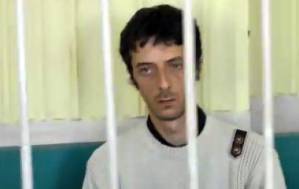Memorial demands that Russia return Mustafa Dzhemiliev’s hostage son to Ukraine

The Memorial Human Rights Centre has accused Russia of using the son of Crimean Tatar leader Mustafa Dzhemiliev as a hostage and means of exerting pressure on his father and demanded that the 33-year-old be returned to Ukraine.
Memorial writes that even in the context of the violations of international law linked with Russia’s annexation of Crimea, the fact that Khaiser Dzhemiliev is being held in a Russian prison is unprecedented. It stresses that there are absolutely no grounds for the Russian authorities to be involved in the case of a Ukrainian national convicted of committing a crime against another Ukrainian in Crimea in 2013. The fact that Russia has duplicated a sentence is aimed at giving the semblance of legality to its unlawful imprisonment of the young man in Russia.
Memorial’s statement comes a few weeks after Khaiser’s lawyer Nikolai Polozov reported that Russia had formally rejected Ukraine’s application for the young man’s extradition, despite all legal grounds under bilateral agreements for returning the young man to Ukraine.
Russia has now issued an arrest warrant against Mustafa Dzhemiliev on extraordinarily cynical charges – effectively of trying to enter his homeland. On Feb 2, there was also an attempt to take Mustafa Dzhemiliev’s grandson, Erol Abdulzhelilov away « for a talk » (see: Russian occupiers come for Mustafa Dzhemiliev’s grandson)
Khaiser Dzhemiliev appears to have been moved to Astrakhan around the same time that his father initiated the Crimean Blockade. This was almost certainly a reprisal against his father and illegal even according to Russian legislation which stipulates that he should be imprisoned either according to his place of residence, Crimea, or in the Krasnodar region where the trial took place.
By late November Polozov reported that Khaiser had been twice placed in a punishment cell. Mustafa Dzhemiliev has from the outset accused Russia of using his son as a hostage.
Mustafa Dzhemiliev, who himself spent 15 years in Soviet labour camps, has repeatedly accused the Kremlin of open blackmail by holding his son in prison.
In May 2013 Khaiser Dzhemiliev shot and killed Fevzi Edemov who was working as a guard to the family. All the evidence indicated that this was a tragic accident, and that the correct charge should be of manslaughter through careless use of firearms.
It was under Viktor Yanukovych’s presidency that attempts were first made to use the case against Khaiser to blackmail Mustafa Dzhemiliev by threatening to change the charge from manslaughter to murder. These attempts were continued by Russia following its annexation of Crimea.
In the meantime the Ukrainian authorities passed the case to the Kyiv prosecutor on the basis of the Ukrainian Law on the Occupied Territory. An application to reinstate the original manslaughter charges was allowed, and two Kyiv courts subsequently ruled that Khaiser should be released from custody.
Since these rulings were ignored, Mustafa Dzhemiliev approached the European Court of Human Rights, which on July 10, 2014, ordered Khaiser Dzhemiliev’s release. Instead of complying with the Court in Strasbourg, Russia moved the young Ukrainian to the Krasnodar region in Russia. It also tried to charge Khaiser with murder “out of hooligan motives”, as well as with stealing and keeping a weapon and ammunition.
A Ukrainian court passed sentence in April 2015, with Khaiser’s extradition then immediately demanded, yet ignored, despite all legal requirements under joint agreements being fulfilled.
There was a cheering moment at the end of May when a Russian jury rejected the charges of murder which Russian investigators had insisted on bringing. The jury found Khaiser Dzhemiliev guilty of manslaughter through carelessness and of illegal possession of a weapon, as had the Ukrainian court. It considered that he was worthy of leniency over the charge of possessing a firearm.
The prosecutor ignored this and demanded a 5 year sentence which the court obligingly provided. The Supreme Court, however, reduced this to 3.5 years.
Russia is also claiming, with total disregard for international law, that Khaiser Dzhemiliev is a Russian national.
He is Ukrainian and, as Memorial has reiterated, must be returned to Ukraine now.
Halya Coynash





